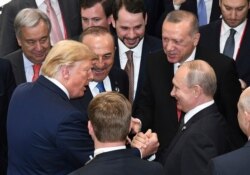To U.S. President Donald Trump and his Russian counterpart, Vladimir Putin, it was a moment for levity as they sat down to talk last week in Japan on the sidelines of the G-20 economic summit. And the American leader had an idea for what to do with the pack of journalists that was hovering there to take note of the two leaders' first public get-together in a year.
"Get rid of them. Fake news is a great term, isn't it?" Trump said. "You don't have this problem in Russia, but we do."
"We also have," Putin answered, in English. "It's the same."
Then, according to news accounts of the exchange, the two leaders shared a chuckle over their seemingly self-satisfying repartee.
Trump routinely describes journalists as "the enemy of the people," an expression first common in world literature and a century ago popularized by Russian autocrat Vladimir Lenin. The U.S. president also regularly describes factual mainstream news stories as "fake news," a term he once acknowledged actually described stories he does not like about himself and his administration. He recently called an accurate New York Times story he did not like — about digital U.S. incursions into the Russian power grid — "a virtual act of treason."
The Committee to Protect Journalists said 28 journalists have been murdered in Russia since Putin first assumed power in 2000, with the reporters and editors often killed under mysterious circumstances. Many of the Russian journalists, according to the New York-based journalists' advocacy group, were well-known for investigating government corruption and wrong-doing by both national and local Russian officials.
To guardians for freedom of the press, Trump's and Putin's brief comments in Osaka, Japan, were not to be taken lightly, and were a telling reflection of the leaders' disdain for the role journalists play in informing the world of important events and writing the first version of history.
'No laughing matter'
Courtney Radsch, the Committee to Protect Journalists' advocacy director, said, "Lobbing terms like fake news at journalists is no laughing matter, and it is deeply concerning to hear both President Trump and Putin yet again wielding this dangerous rhetoric."
"As we have found in our research, this kind of language has real-life consequences for journalists around the world, and according to our research the number of journalists imprisoned on false news charges went from nine in 2016 to 28 in 2018," Radsch said. "President Trump should support and uphold the First Amendment and democratic norms the U.S. has long stood for, particularly when on an influential and public platform like the G-20 summit."
Margaret Sullivan, the media critic for The Washington Post, said in a weekend column that with Trump's frequent attacks on the mainstream news media, there is no reason to believe his exchange with Putin "will make a difference or change minds" about his views of the proper role for a free press in the United States.
"But it really should," she wrote.
Anniversary of Maryland massacre
"That this happened on the first anniversary of the massacre of five employees of the Capital Gazette in Annapolis (Maryland) probably never occurred to him — nor would his staff remind him of something as apparently inconsequential to the administration as that horror," Sullivan said.
"Trump has made no secret of his blatant disrespect for the press, which was a mainstay message of his 2016 presidential campaign — in fact, part of his appeal, apparently, to his most fervent followers," she wrote.
Sullivan noted that Trump has voiced little concern about the killing by Saudi agents of Washington Post contributing columnist Jamal Khashoggi inside the Saudi consulate in Istanbul last October.
"But let's put our president's latest remarks about the news media in context," she concluded, while noting the killing of journalists in Russia. "Putin is an outright enemy of journalistic freedom, one of the world's worst."





